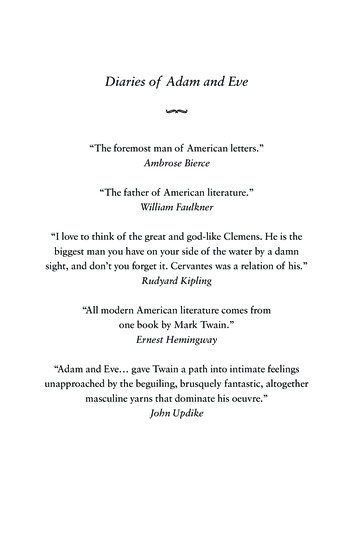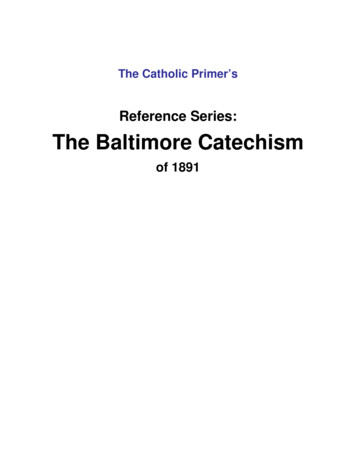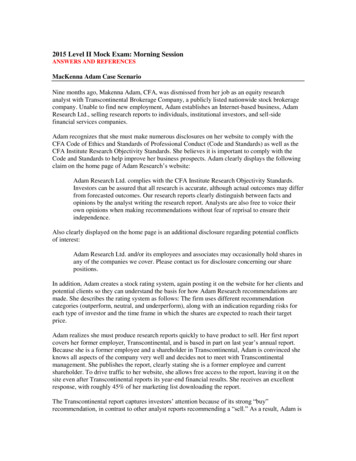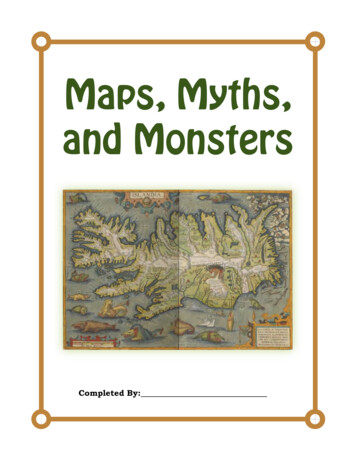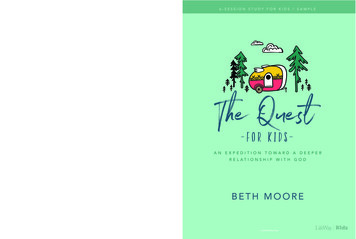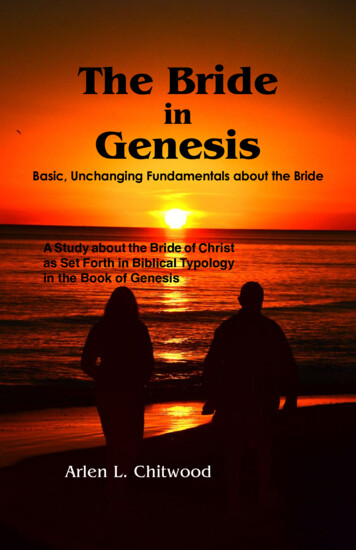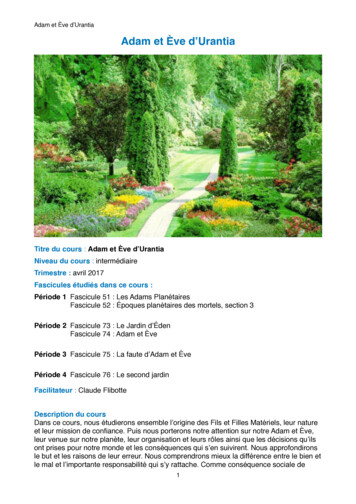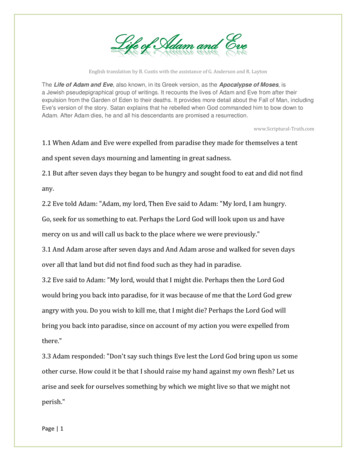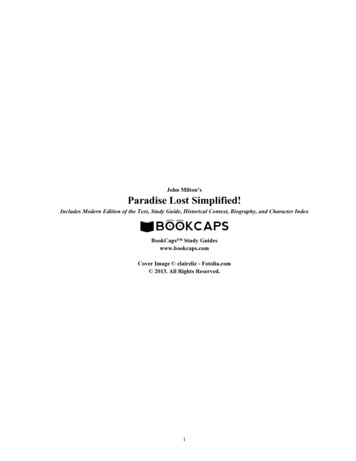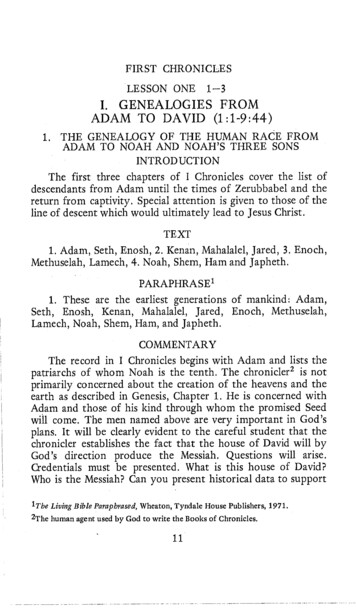
Transcription
FIRST CHRONICLESLESSON ONE 1-3I. GENEALOGIES FROMADAM TO DAVID (1 : 1-9:44)1. THE GENEALOGY OF THE HUMAN RACE FROMADAM TO NOAH AND NOAH’S THREE SONSINTRODUCTIONThe first three chapters of I Chronicles cover the list ofdescendants from Adam until the times of Zerubbabel and thereturn from captivity. Special attention is given to those of theline of descent which would ultimately lead to Jesus Christ.TEXT1. Adam, Seth, Enosh, 2. Kenan, Mahalalel, Jared, 3. Enoch,Methuselah, Lamech, 4.Noah, Shem, Ham and Japheth.PARAPHRASE 1. These are the earliest generations of mankind: Adam,Seth, Enosh, Kenan, Mahalalel, Jared, Enoch, Methuselah,Lamech, Noah, Shem, Ham, and Japheth.COMMENTARYThe record in I Chronicles begins with Adam and lists thepatriarchs of whom Noah is the tenth. The chronicler2 is notprimarily concerned about the creation of the heavens and theearth as described in Genesis, Chapter 1. He is concerned withAdam and those of his kind through whom the promised Seedwill come. The men named above are very important in God’splans, I t will be clearly evident t o the careful student that thechronicler establishes the fact that the house of David will byGod’s direction produce the Messiah. Questions will arise.Credentials must be presented. What is this house of David?Who is the Messiah? Can you present historical data to supportlThe Living Bible Paraphrased, Wheaton, Tyndale House Publishers, 1971.2The human agent used by God to write the Books of Chronicles.11
1-3FIRST CHRONICLESyour concIusions? Both books of Chronicles are designed toanswer these questions. Therefore, the first word in the recordis “Adam”.The name “Adam” means red or ruddy. While it is apersonal name, in the Hebrew it also may mean “mankind”. Agenuine ‘acquaintance must be formed with Adam if one is tocome to appreciate man and the eternal God who created him.Adam is mentioned many times in the scriptures. His creation inGod’s image (Genesis 1:26; 2:7); his appointment in Eden(Genesis 2 :15); his marvelous intelligence manifested as henamed the animals (Geneis 2:20); his participation in thecreation of Eve (Genesis 2:23); his temptation and sin (Genesis3:8); his being driven out of Eden (Genesis 3:23); his role as thefather of at least three sons (Genesis 4:25);and his office as hepointed to the second Adam, Jesus Christ (Romans 5:12-21; ICorinthians 15:22-47)- all need to be carefully explored. WithAdam, God opened the revelation of Himself to mankind. Sinceall men must trace their origin to Adam, the line of godlydescent leading through David to Christ begins with Adam.Seth comes on the scene as Adam’s son when the father wasone hundred thirty years of age sometime after Cain hadmurdered Abel. His name means “setting” or “appointed”.When Abel was killed, Eve said, “God hath appointed meanother seed instead of Abel” (Genesis 4:25). Eve was concerned about the “seed” promised by God in Genesis 3:15.Seth’s main purpose in life was to provide a link in the godlyline of descent. At the age of one hundred and five years Sethbecame the father of Enosh (Genesis 4:26). No other incidentin his life is recorded. He died when he was nine hundred andtwelve years of age. It was at this time that “men began to callupon the name of Jehovah” (Genesis 4:26).The fifth chapter of Genesis records the generations fromAdam to Noah. Considering the age of each father when his sonwas born, a total of one thousand six hundred and fifty sixyears passed from the time of Adam to the beginning of theFlood. When Enosh was ninety years old his son Kenan wasborn. Enosh died at the age of nine hundred and five years.12
GENEALOGY FROM ADAM TO NOAH1-3Kenan was the contribution of Enosh to God’s purpose (Genesis5:9-11). The birth and training of a godly child can be a mostimportant enterprise.When Kenan was seventy years old he became the father ofMahalalel. As had been true with preceding patriarchs, inaddition to the godly seed, other sons and daughters were born(Genesis 5:12-14). Those not in the godly lineage are notnamed, Kenan died when he was nine hundred and ten years ofage,Mahalalel was only sixty five years old when his son, Jared,was born. So Mahalalel lived and died at the end of eighthundred and ninety five years (Genesis 5:15-17). Jared, at theage of one hundred and sixty two years, became Enoch’s father,Having fathered other unnamed sons and daughters, Jared diedin his nine hundred and sixty second year (Genesis 5:18-20).Jared’s love for God is revealed in the character of his son,Enoch.” When Enoch was sixty five years of age he becameMethuselah’s father. When Enoch was three hundred and sixtyfive years old God “took” him. Unlike the patriarchs beforehim, he did not die. When he was a young man, in comparisonwith the long lives of those who preceded and followed him, hewalked with God and did not experience death (Genesis5 :21-24). This reflects the training which Enoch undoubtedlyreceived in his father’s house. Enoch’s faith qualified him forimmortality among the faithful (Hebrews 11:5; Jude 14).At the age of one hundred and eighty seven yearsMethuselah became the father of Lamech* * (Genesis 5 :25-27).After that, other sons and daughters were born into his family.Methuselah’s claim to distinction is that he lived nine hundredand sixty nine years - the most advanced age for man recordedin scriptures. In this long life there is a hint or foretaste ofGod’s purpose for those who love him.Lamech, at the age of one hundred and eighty two years,became the father of Noah (Genesis 5:28-31). The name“Noah” means “comfort” or “rest”. Lamech said that Noah‘Not to be confused with the Enoch of Genesis 4:17.**Not to be confused with the Lamech of Genesis 4:18.13
1-3FIRST CHRONICLESwill “comfort us in our work and in the toil of our hands”. Hereis a man whose godly son rose up and called him “blessed”.Lamech died at the age of seven hundred and seventy sevenyears; but his son was destined to be God’s man in one of thedarkest hours of human history.Considering the promised seed (Genesis 3 :15), Noah carriedin his life the prospects of a better day. When he was fivehundred years old, his sons, Shem, Ham, and Japheth were born(Genesis 5:32). The Flood came when Noah was six hundredyears of age (Genesis 7:6). For one hundred and twenty yearsprior to the Flood Noah was building the ark and doing thework of a “preacher of righteousness’’ (Genesis 6 : 3 ; I1 Peter2: 5 ) . When he attained the age of nine hundred and fifty yearshe died (Genesis 9:29). By his godly life he qualified for the rollof the faithful (Hebrews 11:7). Adam’s relationship to mankindin the beginning is renewed in Noah’s importance in God’s plansafter the Flood. From his three sons, Shem, Ham, and Japheth,(Genesis 9:18,19), the whole earth was eventually to bepopulated.These sons were three in number. God will use only one ofthem as a vehicle for the Godly seed. Genesis, chapter 10,names the sons and descendants of Noah’s sons. Japheth’speople were the Medes, Greeks, Asians, and Europeans. Ham’sdescendants were to live in Egypt, Ethiopia, Libya, and Canaan.Shem’s people, called Semites, were to become the Persians,Assyrians, Babylonians, Syrians, and the Hebrews. The godlyline will come from Shem through Arpachshad (Genesis 10:22).So it is from this point that the genealogy continues in Genesis,chapter 11 (Genesis l l : l O , 11) and carries to Abram (Genesis11:24).Against this background every name in I Chronicles 1:1-4 isvery important. In the history bound up in these lives thefoundation for Israel’s history is laid. Apart from thesepatriarchs, David’s life would have no meaning.14
2. THE DESCENDANTS OF NOAI-I’S SONSAND THE SONS OF ESAU (1:5-54)TEXT5 , The sons of Japheth: Gomer, and Magog, and Madai, andJavan, and Tubal, and Meshech, and Tiras. 6. And the sons ofGomer : Ashkenaz, and Diphath, and Togarmah. 7. And the sonsof Javen: Elishah, and Tarshish, IGttim, and Rodanim.8. The sons of Ham: Cush, and Mizraim, Put, and Canaan. 9.And the sons of Cush: Seba, and Havilah, and Sabta, andRaama, and Sabteca. And the sons of Raamah: Sheba, andDedan. 10. And Cush begat Nimrod; he began to be a mightyone in the earth. 11. And Mizraim begat Ludim, and Anamim,and Lehabim, and Naphtuhim, 12. and Pathrusim, and Casluhim(from whence came the Philistines), and Caphtorim. 13. AndCanaan begat Sidon his first-born, and Heth, 14. and theJebusite, and the Amorite, and the Girgashite, 15. and theHivite, and the Arkite, and the Sinite, 16. and the Arvadite, andthe Zemarite, an the Hamathite.17. The sons of Shem: Elam, and Asshur, and Arpachshad,and Lud, and Aram, and Uz, and Hul, and Gether, and Meshech.18. And Arpachshad begat Shelah, and Shelah begat Eber. 19.And unto Eber were born two sons: the name of the one wasPeleg; for in his days the earth was divided; and his brother’sname was Joktan, 20. And Joktan begat Almodad, and Sheleph,and Hazarmaveth, and Jerah, 21. and Hadoram, and Uzal, andDiklah, 22. and Ebal, and Abimael, and Sheba, 23. and Ophir,and Havilah, and Jobab. All these were the sons of Joktan. 24.Shem, Arpachshad, Shelah, 25. Eber, Peleg, Reu, 26. Serug,Nahor, Terah, 27. Abram (the same is Abraham).28. The sons of Abraham: Isaac, and Ishmael. 29. These aretheir generations: the first-born of Ishmael, Nebaioth; thenKedar, and Adbeel, and Mibsani, 30. Mishma, ahd Dumah,Massa, Hadad, and Tema, 31. Jetur, Naphish, and Kedemah.These are the sons of Ishmael, 32. And the sons of Keturah,Abraham’s concubine: she bare Zimran, and Jokshan, andMedan, and Midian, and Ishbak, and Shuah. And the sons of15
1 :5-54FIRST CHRONICLESJokshan: Sheba and Dedan. 33. And the sons of Midian: Ephah,and Epher, and Hanoch, and Abida, and Eldaah. All these werethe sons of Keturah. 34.And Abraham begat Isaac. The Sons ofIsaac:‘ Esau,: and Israel 35. The sons of Esau: Eliphaz, Reuel,and Jeush, and Jalam, and Korah. 36. The sons of Eliphaz:Teman, and Omar, Zephi, and Gatam, Kenaz, and Timna, andAmalek. 37. The sons of Reuel: Nahath, Zerah, Shammah, andMizzah. 38. And the sons of Seir: Lotan, and Shobal, andZibeon, and Anah, and Dishon, and Ezer, and Dishan. 39.Andthe sons of Lotan: Hori, and Homan; and Timna was Lotan’ssister. 40. The sons of Shobal: Alian, and Manahath, and Ebal,Shephi, and Onam. And the sons of Zibeon: Aiah, and Anah.41. The sons of Anah: Dishon. And the sons of Dishon:Hamran, and Eshban, and Ithran, and Cheran. 42. The sons ofEzer: Bilhan, and Zaavan, Jaakan. The sons of Dishan: Uz andAran.43. Now these are the kings that reigned in the land ofEdom, before there reigned any king over the children of Israel:Bela the son of Beor; and the name of his city was Dinhabah.44. And Bela died, and Jobab the son of Zerah of Bozrahreigned in his stead. 45. And Jobab died, and Husham of theland of the Temanites reigned in his stead. 46. And Hushamdied, and Hadad the sons of Bedad, who smote Midian in thefield of Moab, reigned in his stead; and the name of his city wasAvith. 47. And Hadad died, and Samlah of Marekah reigned inhis stead. 48. And Samlah died, and Shaul of Rehoboth by theRiver reigned in his stead. 49. And Shaul died, and Baal-hanatlthe son of Achbor reigned in his stead. 50. And Baal-hanandied, and Hadad reigned in his stead; and the name of his citywas Pai: and his wife’s name was Mehetabel, the daughter ofMatred, the daughter of Me-zahab. 51. And Hadad died. Andthe chiefs of Edom were: chief Timna, chief Aliah, chiefJetheth, 52. chief Oholibamab, chief Elah, chief Pinon, 53.chief Kenaz, chief Teman, chief Mibzar, 54. chief Magdiel, chiefIram. These are the chiefs of Edom.PARAPHRASE,Chapter 5-9. The sons of Japheth were: Gomer, Magog,16
1 :5-54Madai, Javan, Tubal, Meshech, and Tiras, The sons of Gomer:Ashltenaz, Diphath, and Togarmah, The sons of Javan: Elishah,Tarshish, Kittim, and Rodanim.8. The sons of Ham: Cush, Misream, Canaan, and Put. Thesons of Cush were: Seba, Havilah, Sabta, Raama, and Sabteca,The sons of Raama were Sheba and Dedan. 10. Another of thesons of Cush was Nimrod, who became a great hero. 11, 12. Theclans named after the sons of Misream were: the Ludim, theAnamin, the Lehabim, the Naphtuhim, the Pathrusim, theCaphtorim, and the Casluhim (the ancestors of the Philistines),13-16. Among Canaan’s sons were: Sidon (his first-born) andHeth. Canaan was also the ancestor of the Jebusites, Amorites,Girgashites, Hivites, Arkites, Sinites, Arvadites, Zemarites, andHamathitee.17. The sons of Shem: Elam, Asshur, Arpachshad, Lud,Aram, Uz, Hul, Gether, and Meshech. 18. Arpachshad’s son wasShelah, and Shelah’s son was Eber. 19, Eber had two sons: Peleg(which means “Divided”, for it was during his lifetime that thepeople of the earth were divided into different languagegroups), and Joktan. 20-23. The sons of Joktan: Almodad,Sheleph, Hazarmaveth, Jerah, Hadoram, Uzal, Diklah, Ebal,Abima-el, Sheba, Ophir, Havilah, and Joab. 24-27. So the son ofShem was Arpachshad, the son of Arpachshad was Shelah, theson of Shelah was Eber, the son of Eber was Peleg, The son ofPeleg was Reu, the son of Reu was Serug, the son of Serug wasNahor, the son of Nahor was Terah, the son of Terah wasAbram (later known as Abraham.)28-31. Abraham’s sons were Isaac and Ishmael. The sons ofIshmael: Nabaioth (the oldest), Kedar, Adbeel, Mibsam,Mishma, Dumah, Massa, Hadad, Tema, Jetur, Naphish, andKedemah. 32. Abraham also had sons by his concubineKeturah: Zimram, Jokshan, Medan, Midian, Ishbak, and Shuah.Jokshan’s sons were Sheba and Dedan. 3 3 . The sons of Midian:Ephah, Epher, Hanoch, Abida, and Eldaah. These were thedescendants of Abraham by his concubine Keturah. 34.Abraham’s son Isaac had two sons, Esau and Israel. 3 5 . The sonsof Esau: Eliphaz, Reuel, Jeush, Jalam, and Korah. 36. The sonsDESCENDANTS OF NOAH’S SONS17
1:5-54FIRST CHRONICLESof Eliphaz: Teman, Omar, Zephi, Gatam, Kenaz, Timna, andAmalek. 3-7. The sons of Reuel: Nahath, Zerah, Shammah, andMizzah. 3839. The sons of Esau also included Lotan, Shobal,Zibeon: Anah, Dishon, Ezer, and Dishan; and Esau’s daughterTimna. Lotan’s sons: Hori and Homan. 40. The sonsof Shobzi: Alian, Manahath, Ebal, Shephi, and Onam. Zibeon’ssons were Aiah and Anah. 41. Ahan’s son was Dishon: The sonsof Dishon: Hamran, Eshban, Ithran, and Cheran. 42.The sonsof Ezer : Bilhan, Zaavan, and Jaakan. Dishan’s sons were Uz and&an.43. Here is a list of the names of the kings of Edom whoreigned before the kingdom of Israel began: Bela (the son ofBeor), who lived in the city of Dinhabah. 44. When Bela died,Jobab the son of Zerah from Bozrah became the new king. 45.When Jobab died, Husham from the country of the Temanitesbecame the king. 46. When Husham died, Hadad the son ofBedad-the one who destroyed the army of Midian in the fieldsof Moab-became king and ruled from the city of Avith. 47.When Hadad died, Samlah from the city of Masrekah came tothe throne. 48. When Samlah died, Shaul from the river town ofRehoboth became the new king. 49. When Shaul died, Baalhanan the son of Achbor became king. 50. When Baal-hanandied, Hadad became king and ruled from the city of Pai (hiswife was Mehetable, the daughter of Matred and granddaughterof Mezahab). 51-54. At the time of Hadad’s death, the kings ofEdom were: Chief Timna, Chief Aliah, Chief Jetheth, ChiefOholibamah, Chief Elah, Chief Pinon, Chief Kenza, ChiefTeman, Chief Mibzar, Chief Magdi-el, Chief Iram.COMMENTARYJapheth’s descendants are listed in verses five through seven.He was the father of seven sons. Their names are Gomer, Magog,Madai, Javan, Tubal, Meschech, and Tiras. The sons of Gomerand Javan are also listed. The initial record is in Genesis 10:2-5.The descendants of Gomer settled in the coastlands of the Blackand Caspian Seas and spread westward across Europe. Magogwas the father of ferocious warriors identified with the18
DESCENDANTS OF NOAH’S SONS1:5-54Scythians who lived in the regions beyond the Caspian Sea tothe north. Madai is the father of Medes who lived near thesouth-west shore of the Caspian Sea. Javan was the father of theGreeks who settled near the Aegean Sea. The descendants ofTubal found their place in Asia Minor, while Meschech settledon the south-east shores of the Black Sea in northern Armenia.Tiras is believed to have been the founder of the Thracianpeople on the west coast of the Black Sea.The sons of Gomer are named in verse 6. Ashltenaz settledbetween the Black and the Caspian Seas. There is a possibilitythat the Germans may have come from him. Diphath, calledRiphath in Genesis 10:3, probably settled on the north shoresof the Caspian Sea. The Armenians most likely can trace theirancestry to Togarmah. Javan’s sons named in verse 7 settled inthe region of the Mediterranean Sea. Elishah is associated withthe islands of the Aegean Sea. Tarshish is usually identified withTartessus in Spain far to the west. The island of Cyprus isidentified with Kittim. Rodanim, called Dodanim in Genesis10:4, settled at the south-west shore of the Black sea and wasprobably the father of the Trojans.The sons of Ham are named in verses eight through sixteen,He was the father of four sons, namely, Cush, Mizraim, Put, andCanaan. Cush is identified with Ethiopia. Egypt is often called“Mimaim”. Put was the father of the Libyan people. Canaansettled in the tract of land between Sidon and the Philistinecountry at the eastern extremity of the Mediterranean Sea.Cush’s sons were Seba, Havilah, Sabta, Raama, and Sabteca.These would have settled in the regions of Ethiopia and Africa.The sons of Raama, namely, Sheba and Dedan located in Arabiaon the shore of the Persian Gulf. Nimrod, descendant of Cush,is named in Genesis 10:8. His name means “rebel”. He isidentified as a mighty warrior and hunter. He may have beenone of earth’s earliest kings ruling over many people in theTigris-Euphrates valleys. The descendants of Mizraim wereLudim, Anamin, Lehabim, Naphtuhim, Pathrusim, Casluhim,and Caphtorim. We would expect to locate most of these in theenvirons of Egypt and the Delta country. Pathros usually refers19
1 :5-54FIRST CHRONICLESto Upper Egypt. The name “Philistine”, according to anEthiopic root, means “emigrants” . . . Jeremiah 47:4 and Amos9 :7 relate the Philistines to Caphtorum. The Philistines mayhave come partly from Egypt and partly from the Mediterranean region.Canaan’s descendants were Sidon, Heth, Jebusites,Amorites, Girgashites, Hivites, Arkites, Sinites, Arvadites,Zemarites, and Hamathites. The Canaanite people all settled atthe eastern extremity of the Mediterranean Sea. The personalname “Sidon” is immortalized in the famed Phoenician city.Heth’s people were called Hittites and were one of the sevennations which had to be overcome in the conquest of Canaan.The Jebusites very early settled in Jerusalem and had to bedisplaced in David’s day. The Amorites were mountain peopleand were located east and west of the Jordan River. TheGirgashites were one of the seven nations occupying Canaan inJoshua’s day. The Hivites, Arkites, Sinites, Arvadites, Zemarites,and Hamathites settled in the regions of Phoenicia and theLebanon mountains.The sons of Shem are of greatest interest to the Chronicler.According to the record in Genesis 10:22, Shem was the fatherof five sons: Elam, Asshur, Arpachshad, Lud, and h a m . Elamsettled beyond the Tigris River to the east near the Persian Gulf.Asshur is recognized as the ancestor of Assyria and settled inthe upper region of the Tigris River. Terah and Abram wereArpachshadites. They lived in ancient Ur, about one hundredand fifty miles north of the Persian Gulf. Lud probably settledin the Euphrates River valley. Later his people moved westwardinto the regions of Asia Minor. The Syrian people trace theirbeginnings to Aram. Their ancient capital was Damascus whichwas located about one hundred and thirty miles NNE ofJerusalem. Uz, Hul, Gether, and Meschech are identified as thesons of Aram.Of all the sons of Shem (Semites) the writer of this record ismost concerned with Arpachshad. The godly line of descent islocated in 1:24-27. Shelah was Arpachshad’s son. Eber wasShelah’s son. Eber had two sons, Peleg and Joktan. The sons of20
DESCENDANTS OF NOAH’S SONS1:5-54descendants of Joktan were Alrnodad, Sheleph, Hazarmaveth,Jerah, Hadoram, Uzal, Diklah, Ebal, Abimael, Sheba, Ophir,Havilah, and Jobab. All of these most likely settled in Arabia.Sheba settled at the south-west extremity o f Arabia near theRed Sea. From this place the queen came to visit Solomon.Ophir and Havilah were the names of places in the same generalarea as Sheba. Both of these were renowned as places whichprovided the finest gold.’In one brief statement the chronicler moves from Shem toAbram. All the persons named in verses 24-27 are Shem’s directdescendants. The original genealogy is recorded in Genesis11:lO-26. These people are all Semites. Eber is regarded bysome as the founder of the Hebrews. The name “Eber” means“regions beyond” or “to pass over”. The Hebrews passed overthe Euphrates River. Abraham is the first person in Bible recordwho is called a “Hebrew” (Genesis 14:13).Verses 28-31 tell about Isaac and Ishmael. God’s promise isbound up in Isaac, the son of the promise. Ishmael, the child ofworldly wisdom, became the father of twelve sons and a greatdesert chieftain. Kedar, Teman, and Dumah are mentioned onoccasion in the Bible record. They lived on the edge of thedesert adjacent to Palestine and Syria.Late in life Abraham married another wife, Keturah. Shewas the mother of six of Abraham’s sons, Like Ishmael, theytook up their abode in the desert. Midian, Abraham’s son,settled east of the Sinai penninsula beyond the Gulf of Aqaba.Moses married among these people,Isaac’s sons were Esau and Israel, or Jacob. God’s purposewas to be worked out through Jacob and his seed. David camethrough Jacob’s line, Nevertheless, Esau was Isaac’s son and hewas destined to have a place in history. The sons of Esau andthe kings of Edom (Esau’s country) are named in verses 35-54.Genesis 36:l-5 lists the five sons of Esau. Esau’s country wasMount Seir and the land of Edom south of the Dead Sea. All ofthese persons named in verses 35-54 settled in that generalIPfeiffer, Charles F., Baker’s Bible Atlas, Baker Book House, Grand Rapids,Michigan, 1961, pp. 37-44.21
1:5-54FIRST CHRONICLESregion. The descendants of Seir are listed in verses 38-42. Seirmeans “rough”. He is to be identified as a person and he isknown as the ancestor of the Horites who had lived in whatbecame the Edomite country. These sons of Seir are notimportant from the Messianic viewpoint. They are listed here tounderscore the fact that Esau was not completely disinherited.His people were numerous and they inhabited an importantterritory.The kings and dukes, or chiefs, of Edom are listed in verses4 3 - 54. This information is initially recorded in Genesis36:31-43. The author of this account is not primarily interestedin Esau and his people; but they were a people with whomIsrael had to reckon. The genealogies of this chapter with theirparallels in Genesis are notable for standing unique in all theworld’s writing and in rising far above all the world’smythology. They retrace the pedigree of the wide family ofmen and especially of the now scattered family of the Jew to itsorigina1.lChapter two proceeds to present the genealogy of Jacob andJudah. Verses one and two list the twelve sons of Jacob, herecalled Israel, the name Jacob received at Peniel (Genesis 32 :28).First listed are Leah’s six sons, namely Reuben, Simeon, Levi,Judah, Issachar, and Zebulun. Bilhah’s elder son, Dan, then isnamed. The sons of Rachael, Joseph and Benjamin, follow.Bilhah’s second son, Naphtali, is listed. Finally, Gad and Asher,Zilpah’s sons complete the twelve names. It is of interest tonote that the usual listing of Ephraim and Manasseh does notappear and that their father Joseph is listed in his own place.The evident design of the chronicler here is to emphasizethe importance of Judah. Verses 3-55 give attention to Judahand his descendants. Jacob had said (Genesis 49:lO) that thesceptre would not depart from Judah until Shiloh should come.“Shiloh” is a descriptive term signifying a prince of peace, akingly seed. God’s messianic purpose certainly involves the tribeof Judah. Judah’s five sons are named in verses 3-6. They areIspence, H. D. M., The Pulpit Commentary,, I Chronicles, Funk and Wagnalls,London, n.d., p. 6.22
DESCENDANTS OF NOAH’S SONS1 : 5-54named originally in Genesis, chapter 38. Sua was a Canaanite,Judah married his daughter who is not named. She bore himthree sons, namely, Er, Onan, and Shelah. Er and Onan werestricken down by God. Judah promised Shelah as a husband toTamar who had been wife to Shelah‘s older brothers, Judahneglected to fulfil his promise. Tamar joined herself to aheathen temple and played the part of a “religious prostitute”.Judah visited this Temple and Tamar became the mother ofJudah’s last two sons, Perez and Zerah. The line of messianicdescent came through Perez (Matthew 1: 3).The sons and descendants of Perez and Zerah are named inverses 5-8. Since the promised seed will come through Perez, hisson Hezron is named in verse 5, then Hezron’s line is continuedin verse 9. The sons of Zerah are named in I Kings 4:31. In thisconnection Solomon’s great wisdom is contrasted with thewisdom of these men. Achar (Achan, Joshua 7: l ) , is identifiedwith the man who took the devoted things at the time of theoverthrow of Jericho. The sons of Hezron are listed in verses9-24. There are some persons of outstanding importance whoare members of this family. Chelubai is identified with Caleb,the faithful spy and great warrior. Boaz became the husband ofRuth and father of Obed. Obed was Jesse’s father and Jesse wasthe father of eight sons (I Samuel 16:10, l l ) , of whom Davidwas the youngest. Probably one of David’s brothers died ininfancy (v. 16). David’s sister, Zeruiah, is renowned in the Biblerecord as the mother of Joab, Abishai, and Asahel, David’ssister, Abigail, was the mother of Amasa who once wasAbsalom’s captain and later was David’s captain of the host (I1Samuel 17:25). Hur (v. 20) was the man who along with Aaronsupported Moses’ arms in the conflict with the Amaleltites(Exodus 17:12). Bezalel, Hur’s grandson, was a master craftsman in the construction of the tabernacle (Exodus 31:2).Therewas intermarriage between the tribes of Judah and Manasseh asHezron married a daughter of Machir.The family of Jerahmeel, Hezron’s son, is listed in verses25-41. Several of the names in this table are familiar Hebrewnames: Nadab, Jonathan, Nathan, Jehu, Azariah, and Shallum.23
1:5-54FIRST CHRONICLESNothing more definitive is known concerning any of thesebeyond the fact that they are in the line of descent from Perezthrough Hezron and Jerahmeel.Hezron’s sons were Jerahmeel, Ram and Chelubai (Caleb - IChr. 2:9). Verses 42-49 list the sons of Ca1eb.l This Caleb is theone we know as the faithful spy and the one who took hisinheritance in Hebron in the tribe of Judah. We are told that hisdaughter was named Achsah (2:49). She was given as a wife toCaleb’s nephew, Othniel (Judges 1:12, 13). There were villagesin Judah, such as Ziph and Maon, which probably were namedafter persons in Caleb’s family. Hur, who was a son of Caleb,evidently had a son named Caleb. His people, also, lived in theJudah country. Ephrath was an old name for Bethlehem.Kiriath-jearim was in the environs of Jerusalem. Eshtaol (verse53) was the village near Samson’s birthplace in the tribe of Dan.The Kenites2 were a branch of the Midianite people and theylived in Judah toward the southern and western borders of theDead Sea. Rechab was founder of a people called Rechabites(Jeremiah 35:2). They were a people whose moral standardswere so high that they shamed the Hebrews.David’s sons and family are listed in 3:l-9. This thirdchapter is concerned only with the families of David andSolomon. All that has gone before in the record in Chronicles ispreparatory for this account. Verses 1-4 list David’s wives andsons during the seven and one-half years he was in Hebron.David’s wives were Ahinoam from Jezreel (there was a town inJudah by this name-Joshua 15:56);Abigail from Carmel (also avillage in Judah-Joshua 15:55); Maacah from Geshur (a districtbeyond the Jordan in the Bashan country); Haggith, Abital, andEglah. Each of these six wives bore David a son. These were hissons born in Hebron: Amnon, Daniel (or Chileab- 1 Samuel3: 3), Absalom, Adonijah, Shephatiah, and Ithream. Amnon,Absalom, and Adonijah figure prominently in the history ofDavid’s reign as king of Israel.Ispence, H. D. M., The Pulpit Commentary, I Chronicles, p. 22.b o k , F, C., The Bible Commentary, Baker Book House, Grand Rapids, Mich., ISamuel-Esther, 1967, p. 321.24
DESCENDANTS OD NOAH’S SONS1 :5-54The sons of David born in Jerusalem were Shimea(Shammua), Shobab, Nathan and So1omon.l These wereDavid’s sons by Bathsheba. In addition to these, Ibhar,Elishama, Eliphelet, Nogah, Nepheg, Japhia, Eliada, Elishama(Elishua - I Chr, 14:5), and Eliphelet (Elpelet - I Chr. 14:5)were born to David in Jerusalem. The mothers of these sons arenot identified, A daugher, Tamar, was born in Jerusalem toMaacah. The record in I1 Samuel 3:2-5 and I1 Samuel 5:13-16lists seventeen sons of David and states that he was also thefather of “daughters”. The record here says that David had sonsof the concubines. Of the children of David born in Jerusalem,Solomon and Tamar are the most important in the Biblerecords. Tamar was humiliated by her half-brother, Amnon (I1Samuel 13:14). Solomon succeeded David on Israel’s throne.The descendants of Solomon are listed in 3 :10-24. Solomonhad seven hundred wives and three hundred concubines (I Kings11:3). Only one son, ,Rehoboam, is identified in the Bible asSolomon’s son. Abijah, Asa, Jehoshaphat, Joram, Ahaziah,Amaziah, Azariah, Jotham, Ahaz, Hezekiah, Manasseh, Amon,Josiah make up the roll-call of the kings of Judah. Josiah’s sonswere Johanan, Jeho
pointed to the second Adam, Jesus Christ (Romans 5:12-21; I Corinthians 15:22-47)- all need to be carefully explored. With Adam, God opened the revelation of Himself to mankind. Since all men must trace their origin to Adam, the line of godly descent leading through David to Christ begins with Adam.
